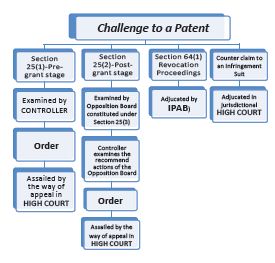'Multiplicity of Proceedings of Patent cases' happens in the form of simultaneous 'revocation petitions', 'infringement suits' and 'Counter claims' in different fora. The Supreme Court Bench comprising of Justice A.K. Patnaik and Justice Jagdish Singh Khekhar on June 2, 2014 in a landmark decision offered simplified course of action to be adopted in Enercon India versus Dr. Alloy Wobben patent dispute. The judgment set a clear protocol with regards to 'multiplicity of proceedings' thereby streamlining the procedural aspects of patent cases.
Fig: 1 Challenges to a granted Patent: Patents can be invalidated /challenged by the following routes

The Factual Position
The appellant in the instant case, Dr. Aloys Wobben was a scientific engineer who has to his credit, several inventions in the field of wind turbine generators and wind energy convertors, with 100 patents in India1.
The respondents, Yogesh Mehra and Ajay Mehra were joint venture partners of Dr. Wobben, in carrying out the manufacturing process under the name of Enercon India Limited, which was formed in 1994. The licences to use the technical know-how were vested by Dr. Wobben with Enercon Indian Limited, through written intellectual property licence agreements. However, the agreement dated 29.9.2006 was terminated by Enercon GmbH in 2008, due to non-fulfillment of obligations. Dr. Aloys Wobben had hence contended that even after the termination of the agreements, the respondents continued the use of the patents, without due authority.
Following the legal tussle, Dr.Aloys Wobben has filed atleast 19 infringement suits before the High Court and Enercon India Limited have filed atleast 23 "revocation petitions" before the Appellate Board, praying for the revocation of the patents held in the name of the appellant. The respondents have also filed "counter claims" to the "patent infringement suits" filed by the appellant. The litigation had now reached the Supreme Court, in order to determine the correct course of action to be adopted, in the light of compound proceedings having been invoked by the two parties.
The Controversy in hand
The Supreme Court in its judgment examined the various provisions of the Indian Patents Act 1970, in drawing a protocol with regards to multiple proceedings of patent cases. The Supreme Court noted that in challenging a patent by the way of opposition, "any person" can represent by the way of opposition to an application for the grant of the patent under Section 25(1) of the Patents Act , whereas only a "person interested" can challenge the grant of a patent under section 25(2) by issuing a notice of opposition. Therefore, Section 25(2) and Section 64(1) are alike considering the locus to raise a challenge to a patent granted lies with "any person interested" in both of these provisions.
The above examination identifies the conflict that if any proceedings have been initiated by "any person interested" under section 25(2) of the Patents Act, the same will eclipse the right of the same person to file a revocation petition under section 64(1) of the Patents Act2 . Therefore, the right granted under section 64(1) of the Patents Act to file a "Counter claim" in response to an infringement suit in order to revoke a patent will also be eclipsed.
The Court mentioned the contentions of the learned counsel of the appellants in reference to the use of the word "or" in Section 64(1) which demonstrates the liberty granted to any person to file a "revocation petition"), to challenge the grant of a patent to an individual cannot be adopted simultaneously by the same person, i.e., firstly by filing a "revocation petition" and at the same time by filing a "counter claim" in a suit for infringement. The Counsel further submitted that the word "or" is clearly disjunctive and cannot be read as conjunctive and suggested the respondents to choose one of the above remedies. The Court further admitted the averments of the appellants mentioning that the course of action of the respondents that could lead to one finding in the "revocation petition" and a different finding in the "counter claim".
In case both the forums the IPAB for revocation and HC as a counter-claim have already been approached the Supreme Court laid down the following rules;
- If 'any person interested' has filed a post-grant opposition before the Controller, the act would eclipse all similar rights available to the same person under revocation proceedings before IPAB as well as the right to seek the revocation of patent as a defendant through a "counter-claim" in an infringement suit.
- If a revocation petition is filed before the filing of a counter-claim in an infringement suit, the defendant will be disentitled to seek revocation of the patent in the infringement suit through a counter-claim.
- If revocation of a patent has already been sought in an infringement suit through a counter-claim, the defendant will not be able to file a revocation petition before the IPAB.
Interpretation of Counter-claim
The court stated that a counter-claim is essentially a suit filed by the defendant and for all intents and purposes has to be treated like a plaint. Since a counterclaim is an independent suit, it cannot be allowed to proceed, where the defendant has already initiated action in another forum, on the same cause of action (Section 10 and 151 CPC). Therefore, prior proceedings stand.
Multiple Challenges
In the present case between Dr. Aloys Wobben and Enercon India Limited, the prayers made in revocation petitions and counter-claims are of same nature, between the same parties though it may be in respect of different patents. The final contention by the appellants was based on the consent order passed by the High Court on 1.9.2010, wherein the respondents (as defendants) had agreed, that the suits and "counterclaims" pending between the parties should be consolidated, and should be heard by the High Court itself. It was submitted by the appellants, that even after the above consent order dated 1.9.2010 was passed by the High Court; the respondents had continued to pursue their revocation petitions before the Appellate Board. The Court held that "Having consented to one of the available remedies postulated under law, it would not be open to either of the consenting parties, to seek redressal from a forum in addition to the consented forum. We, therefore hereby affirm that the consent order passed by the High Court on 1.9.2010, being on the subject of procedure, and being before a forum which had the statutory jurisdiction to deal with the same, was fully justified in the facts and circumstances of the present case".
Conclusions
The Supreme Court's judgment on streamlining the judicial proceedings of patent cases clearly mandates that if a revocation petition is filed before an infringement suit, the petitioner would be disentitled in law from seeking the revocation of the patent through a counter-claim. Given the unique nature of patent rights and the flexibilities of common law, the judgment subtly lays a clear path for patent litigation, so as to avoid multiplicity of litigation and answers several questions regarding proper use of forum for litigation.
Footnotes
2. http://supremecourtofindia.nic.in/outtoday/ac671813.pdf
The content of this article is intended to provide a general guide to the subject matter. Specialist advice should be sought about your specific circumstances.


